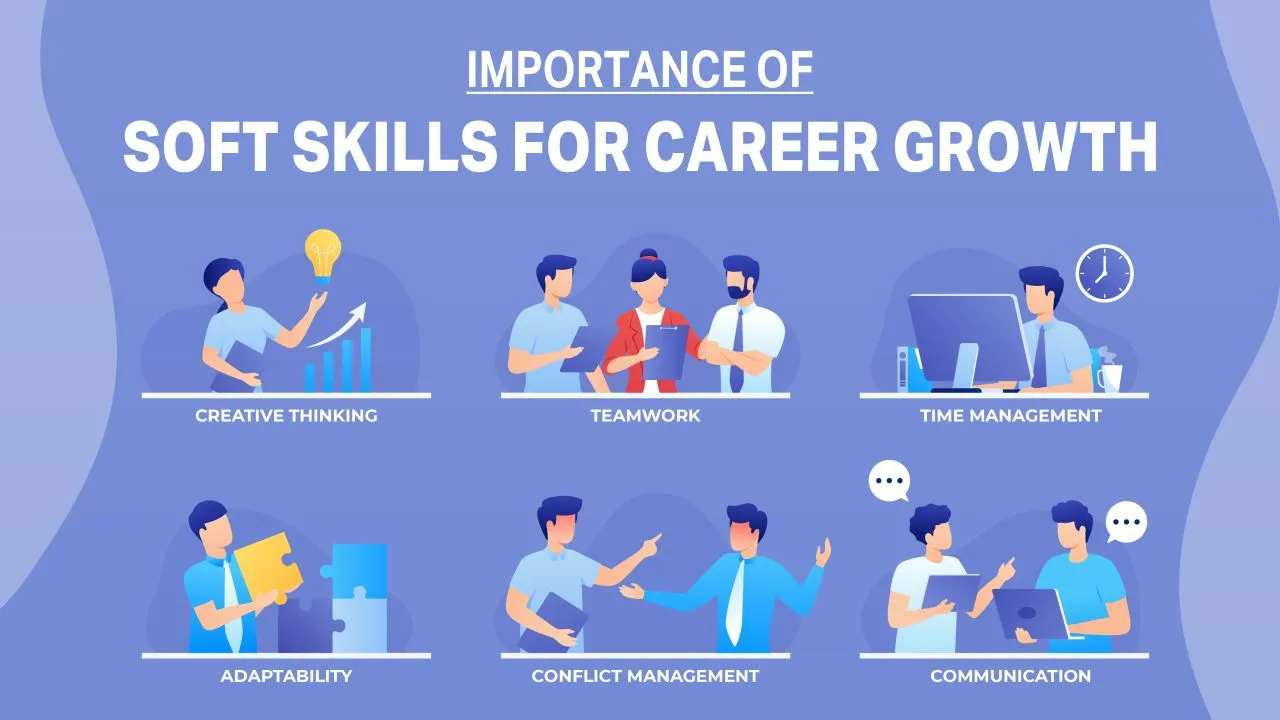
Introduction:
Entering the professional world as a fresh graduate is an exhilarating experience, filled with anticipation and the promise of new opportunities. While academic qualifications and technical skills are undoubtedly essential, the importance of soft skills cannot be overstated. Soft skills, often referred to as interpersonal or people skills, encompass a range of attributes that go beyond technical expertise. In this article, we will delve into the significance of soft skill training for freshers and how it plays a pivotal role in shaping successful and fulfilling careers.
Understanding Soft Skills:
Soft skills encompass a broad spectrum of attributes that are non-technical in nature but are crucial for effective workplace communication, collaboration, and overall career success. Some of the key soft skills include communication skills, teamwork, adaptability, problem-solving, time management, leadership, and emotional intelligence. Unlike hard or technical skills, which are specific to a particular job or industry, soft skills are transferable and can be applied across various professional settings.
The Evolving Job Market:
In recent years, the dynamics of the job market have undergone significant changes. Employers are increasingly recognizing the value of a well-rounded candidate who possesses not only technical proficiency but also the ability to navigate the complexities of the modern workplace. As industries become more interconnected and globalized, the demand for employees with strong soft skills is on the rise.
Soft Skills and Employability:
One of the primary reasons soft skills are gaining prominence is their direct impact on employability. In a competitive job market, freshers with a robust set of soft skills are often more appealing to employers. Effective communication, for instance, is crucial in building relationships with colleagues, clients, and superiors. A candidate who can articulate ideas clearly, listen actively, and convey information persuasively has a distinct advantage in a professional setting.
Teamwork and Collaboration:
The ability to work collaboratively is another soft skill that is highly sought after by employers. Many jobs today require individuals to function as part of a team, and those who can contribute positively to a collaborative environment are more likely to excel. Soft skill training equips freshers with the tools to navigate group dynamics, resolve conflicts, and foster a culture of cooperation within the workplace.
Adaptability in a Rapidly Changing Landscape:
In today’s fast-paced and ever-evolving business landscape, adaptability is a key determinant of success. Soft skills such as adaptability and resilience enable freshers to navigate change, learn quickly, and stay relevant in the face of technological advancements. Employers value individuals who can embrace change and contribute proactively to the growth and adaptability of the organization.
Problem-Solving and Critical Thinking:
Soft skills contribute significantly to an individual’s problem-solving and critical thinking abilities. The capacity to analyze situations, think creatively, and make informed decisions is invaluable in any professional setting. Soft skill training empowers freshers to approach challenges with a positive mindset, fostering a problem-solving culture within the workplace.
Time Management and Productivity:
Effective time management is a soft skill that directly impacts an individual’s productivity. Freshers entering the workforce often face the challenge of juggling multiple tasks and deadlines. Soft skill training provides them with strategies to prioritize tasks, manage time efficiently, and maintain a balance between work and personal life. A workforce with strong time management skills is more likely to meet deadlines and contribute to the overall success of the organization.
Leadership and Emotional Intelligence:
While leadership skills are often associated with more experienced professionals, fostering leadership qualities in freshers is equally important. Soft skill training helps develop leadership attributes such as decision-making, motivation, and the ability to inspire and guide others. Additionally, emotional intelligence, the ability to understand and manage one’s emotions and those of others, plays a crucial role in building effective interpersonal relationships and leadership capabilities.
Enhancing Communication Skills:
Communication skills are a cornerstone of effective professional interactions. Soft skill training focuses on honing verbal and written communication skills, enabling freshers to express ideas clearly, engage in active listening, and convey information with impact. Strong communication skills are vital in client interactions, presentations, and everyday workplace communication, contributing to a positive and productive work environment.
The Crucial Role of Soft Skill Training for Freshers in Today's Job Market:
Entering the professional world as a fresh graduate is an exhilarating experience, filled with anticipation and the promise of new opportunities. While academic qualifications and technical skills are undoubtedly essential, the importance of soft skills cannot be overstated. Soft skills, often referred to as interpersonal or people skills, encompass a range of attributes that go beyond technical expertise. In this article, we will delve into the significance of soft skill training for freshers and how it plays a pivotal role in shaping successful and fulfilling careers.
Soft skills encompass a broad spectrum of attributes that are non-technical in nature but are crucial for effective workplace communication, collaboration, and overall career success. Some of the key soft skills include communication skills, teamwork, adaptability, problem-solving, time management, leadership, and emotional intelligence. Unlike hard or technical skills, which are specific to a particular job or industry, soft skills are transferable and can be applied across various professional settings.
The Evolving Job Market:
In recent years, the dynamics of the job market have undergone significant changes. Employers are increasingly recognizing the value of a well-rounded candidate who possesses not only technical proficiency but also the ability to navigate the complexities of the modern workplace. As industries become more interconnected and globalized, the demand for employees with strong soft skills is on the rise.
Soft Skills and Employability:
One of the primary reasons soft skills are gaining prominence is their direct impact on employability. In a competitive job market, freshers with a robust set of soft skills are often more appealing to employers. Effective communication, for instance, is crucial in building relationships with colleagues, clients, and superiors. A candidate who can articulate ideas clearly, listen actively, and convey information persuasively has a distinct advantage in a professional setting.
Teamwork and Collaboration:
The ability to work collaboratively is another soft skill that is highly sought after by employers. Many jobs today require individuals to function as part of a team, and those who can contribute positively to a collaborative environment are more likely to excel. Soft skill training equips freshers with the tools to navigate group dynamics, resolve conflicts, and foster a culture of cooperation within the workplace.
Adaptability in a Rapidly Changing Landscape:
In today’s fast-paced and ever-evolving business landscape, adaptability is a key determinant of success. Soft skills such as adaptability and resilience enable freshers to navigate change, learn quickly, and stay relevant in the face of technological advancements. Employers value individuals who can embrace change and contribute proactively to the growth and adaptability of the organization.
Problem-Solving and Critical Thinking:
Soft skills contribute significantly to an individual’s problem-solving and critical thinking abilities. The capacity to analyze situations, think creatively, and make informed decisions is invaluable in any professional setting. Soft skill training empowers freshers to approach challenges with a positive mindset, fostering a problem-solving culture within the workplace.
Time Management and Productivity:
Effective time management is a soft skill that directly impacts an individual’s productivity. Freshers entering the workforce often face the challenge of juggling multiple tasks and deadlines. Soft skill training provides them with strategies to prioritize tasks, manage time efficiently, and maintain a balance between work and personal life. A workforce with strong time management skills is more likely to meet deadlines and contribute to the overall success of the organization.
Leadership and Emotional Intelligence:
While leadership skills are often associated with more experienced professionals, fostering leadership qualities in freshers is equally important. Soft skill training helps develop leadership attributes such as decision-making, motivation, and the ability to inspire and guide others. Additionally, emotional intelligence, the ability to understand and manage one’s emotions and those of others, plays a crucial role in building effective interpersonal relationships and leadership capabilities.
Enhancing Communication Skills:
Communication skills are a cornerstone of effective professional interactions. Soft skill training focuses on honing verbal and written communication skills, enabling freshers to express ideas clearly, engage in active listening, and convey information with impact. Strong communication skills are vital in client interactions, presentations, and everyday workplace communication, contributing to a positive and productive work environment.
Cultural Sensitivity and Diversity:
In an era of global connectivity, cultural sensitivity and the ability to work in diverse environments have become paramount. Soft skill training exposes freshers to scenarios that develop their understanding and appreciation of diverse perspectives, fostering an inclusive work culture. The ability to work seamlessly with individuals from different backgrounds is not only a testament to one’s adaptability but also a key factor in contributing to a harmonious workplace.
Networking and Relationship Building:
Soft skills play a crucial role in networking and relationship building, which are essential components of career growth. Freshers who can establish and maintain professional relationships are more likely to access mentorship opportunities, industry insights, and potential career advancements. Soft skill training teaches the art of networking, helping individuals build a strong professional network that can prove invaluable throughout their careers.
Conflict Resolution and Negotiation:
Conflicts are inevitable in any workplace, and the ability to navigate them effectively is a hallmark of strong soft skills. Soft skill training equips freshers with conflict resolution techniques, teaching them to address disagreements professionally and find mutually beneficial solutions. Additionally, negotiation skills, an integral part of soft skill development, empower freshers to navigate salary discussions, project timelines, and other situations where effective negotiation is crucial.
Workplace Etiquette and Professionalism:
Soft skill training emphasizes the importance of workplace etiquette and professionalism. Understanding the nuances of office decorum, appropriate communication channels, and professional conduct contributes to a positive work environment. Freshers who demonstrate a high level of professionalism are more likely to gain the trust and respect of their colleagues and superiors, paving the way for career advancement.
Resilience and Stress Management:
The professional world can be demanding, and the ability to handle stress and setbacks is a vital soft skill. Resilience, the capacity to bounce back from challenges, is nurtured through soft skill training. Freshers who can maintain composure under pressure, manage stress effectively, and persevere through difficulties exhibit a level of emotional intelligence that is highly valued in today’s competitive job market.
Continuous Learning and Skill Development:
Soft skill training instills a mindset of continuous learning and skill development. In an era where technological advancements are rapid, the ability to adapt and upskill is crucial for career longevity. Soft skills contribute to a growth mindset, encouraging freshers to seek out learning opportunities, stay updated with industry trends, and invest in their professional development throughout their careers.
Conclusion:
In conclusion, the importance of soft skill training for freshers cannot be overstated. While technical skills and academic qualifications are essential prerequisites, soft skills are the catalysts that propel individuals toward success in their careers. Soft skills is crucial not for the professional development, but for personal development as well. People who wants to grow in their career, its important for them to pay equal attention towards their interpersonal skills. It is difficult to survive in the corporate worls, if you do not have command over soft skills. The modern job market places a premium on well-rounded professionals who can navigate the complexities of the workplace with ease. Soft skill training equips freshers with the tools needed to communicate effectively, collaborate seamlessly, adapt to change, and contribute meaningfully to the success of their organizations.
As freshers embark on their professional journeys, investing in soft skill development proves to be an invaluable asset that not only enhances employability but also paves the way for a fulfilling and successful career. The holistic approach of soft skill training addresses various facets of professional life, from effective communication and teamwork to adaptability, leadership, and stress management. As the workplace continues to evolve, those armed with a robust set of soft skills are better positioned to thrive and make enduring contributions to the organizations they serve.
Related Posts
Scavenger Hunts: A Fun Way to Boost Your Cognitive Abilities
Scavenger Hunts: A Fun Way to Boost Your Cognitive Abilities Imagine participating in a game where excitement and brainpower intertwine, leading to a fun-filled yet

Unleashing the Power of the Quantum Realm: A Deep Dive into Quantum Computing
Unleashing the Power of the Quantum Realm: A Deep Dive into Quantum Computing The world of technology is always evolving, and with it comes the

Navigating Mental Health in College: Breaking the Stigma – Geeta University
Navigating Mental Health in College: Breaking the Stigma – Geeta University College life is a transformative journey filled with excitement and challenges. However, it is

